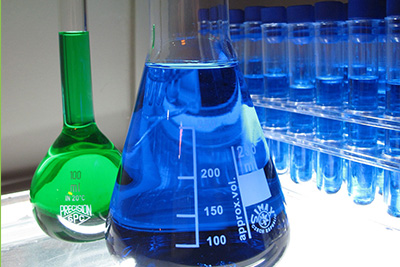-
![The Chemical Basis···]() 2025-01-02 The Chemical Basis for Octyltin Merc···
2025-01-02 The Chemical Basis for Octyltin Merc···The efficacy of octyltin mercaptides (OTM) in stabilization is rooted in their unique chemical structure, which facilitates their role as stabilizers. OTM consists of an octyltin core bonded to mercaptide ligands, enabling strong interactions with polymers. These interactions prevent degradation by mitigating the effects of heat, light, and other environmental stressors. The sulfur atoms in the mercaptide ligands contribute significantly to the stability by forming stable complexes with tin atoms, thus enhancing the overall performance of OTM as a stabilizing agent. This chemical mechanism underscores the importance of OTM in extending the lifespan of polymer materials in various applications.
read more > -
![Octyltin Mercaptid···]() 2025-01-02 Octyltin Mercaptide’s Contribution t···
2025-01-02 Octyltin Mercaptide’s Contribution t···Octyltin mercaptides (OTMs) have played a significant role in advancing the development of high-performance specialized coatings. These compounds enhance the durability, adhesion, and resistance properties of coatings, making them suitable for various industrial applications. OTMs act as effective stabilizers and cross-linking agents, contributing to the overall improvement of coating performance. Their unique chemical structure allows for better interaction with other coating components, resulting in enhanced protective qualities and extended service life. Consequently, the use of OTMs has become indispensable in formulating advanced coatings for demanding environments.
read more > -
![Enhancing Polymer ···]() 2025-01-02 Enhancing Polymer Flexibility and Du···
2025-01-02 Enhancing Polymer Flexibility and Du···This article explores the use of octyltin mercaptide (OTM) in enhancing the flexibility and durability of polymer materials. OTM acts as an effective stabilizer and modifier, improving the performance of plastics and polymers across various applications. By incorporating OTM, these materials exhibit greater resistance to thermal degradation and mechanical stress, leading to extended lifespan and broader usability. The study highlights the significant role of OTM in advancing polymer technology for industries ranging from automotive to electronics.
read more > -
![The Future of Octy···]() 2025-01-02 The Future of Octyltin Mercaptide in···
2025-01-02 The Future of Octyltin Mercaptide in···The article explores the future potential of octyltin mercaptide (OTM) in biocidal applications, particularly within the marine industry. It delves into new directions and opportunities for utilizing OTM as an effective biocidal agent to combat marine biofouling, highlighting its unique properties and advantages over traditional methods. The discussion encompasses recent research findings and technological advancements that could enhance the efficacy and environmental safety of OTM-based solutions.
read more > -
![Toxicity and Regul···]() 2025-01-02 Toxicity and Regulatory Trends in Or···
2025-01-02 Toxicity and Regulatory Trends in Or···The use of organotin compounds, known as OTMs, has sparked significant concern due to their toxicity and adverse effects on both environmental and human health. Regulatory bodies worldwide are increasingly scrutinizing these compounds, leading to stricter usage guidelines and limitations. This growing regulatory pressure reflects the mounting evidence of organotin compounds' harmful impacts, necessitating a comprehensive understanding of their environmental persistence and health risks. As a result, stakeholders must adapt to these changing trends to mitigate potential hazards and comply with evolving regulations.
read more > -
![Organotin Compound···]() 2025-01-02 Organotin Compounds: A Study of Thei···
2025-01-02 Organotin Compounds: A Study of Thei···This study explores the significant role of organotin compounds, particularly Organotin Macromers (OTM), in the polymer industry. It provides a comprehensive analysis of their benefits in polymer stabilization. Organotin compounds, due to their unique chemical properties, enhance the durability and longevity of polymers by preventing degradation caused by heat, light, and other environmental factors. This research underscores their crucial application in improving the performance and quality of polymeric materials.
read more > -
![Octyltin Mercaptid···]() 2025-01-02 Octyltin Mercaptide and Its Role in ···
2025-01-02 Octyltin Mercaptide and Its Role in ···Octyltin mercaptides (OTMs) play a significant role in advancing polymer technology by enhancing the thermal stability, mechanical properties, and processability of polymers. These organotin compounds act as effective stabilizers and catalysts, contributing to the development of advanced polymer materials. The incorporation of OTMs improves the performance of various polymeric systems, enabling technological innovations in industries such as automotive, construction, and electronics. OTMs' unique ability to tailor polymer properties makes them indispensable in modern polymer science and technology.
read more > -
![Environmental Effe···]() 2025-01-02 Environmental Effects of Octyltin Me···
2025-01-02 Environmental Effects of Octyltin Me···The use of octyltin mercaptides in rubber manufacturing has significant environmental impacts. These compounds, used as stabilizers, can leach into the environment during production and disposal phases. Studies indicate that octyltin compounds bioaccumulate in aquatic ecosystems, posing risks to wildlife and human health. Their persistence and toxicity contribute to soil and water pollution, leading to long-term ecological damage. Effective mitigation strategies include improving waste management practices and developing alternative, less harmful stabilizers for rubber products.
read more > -
![Octyltin Mercaptid···]() 2025-01-02 Octyltin Mercaptide as a Green Alter···
2025-01-02 Octyltin Mercaptide as a Green Alter···This article explores the potential of octyltin mercaptides (OTM) as an environmentally friendly alternative in polymer stabilization. It examines whether OTM can serve as a sustainable choice for polymer production, discussing its properties, benefits, and environmental impact compared to traditional stabilizers. The analysis indicates that OTM offers promising eco-friendly characteristics but also highlights areas needing further research to fully assess its sustainability.
read more >









